Stacking 360: An arts and culture journalist interviews a film director about Russian dolls, budgets and petit pois... listen now
 About GamePeople
About GamePeople
Subscribe to the Game People column:![]() RSS or
RSS or
![]() Newsletter.
Newsletter.
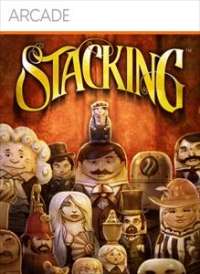
Format:
360
Genre:
Platforming
Style:
Singleplayer
Thirdperson
Further reading:
Download
iTunes
Jon Morgan - Tired Gamer
Andy Robertson - Family Gamer
Iain Simons -
Chris Jarvis - Novel Gamer
Alex Beech - Scared Gamer
Buy/Support:
Support Game, click to buy via us...
Other GamePeople columnists have reviewed this from their perspective - huh?:
Story Gamer (360)
Scared Gamer (360)
Tech Gamer (360)
Reporting Gamer (360)
Tired Gamer (360)
Novel Gamer (360)
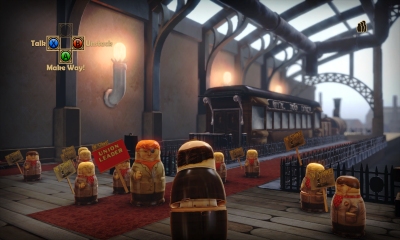
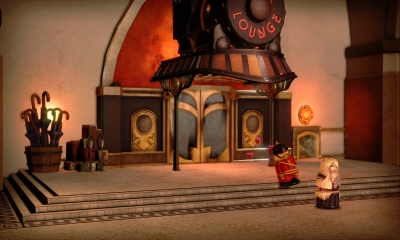
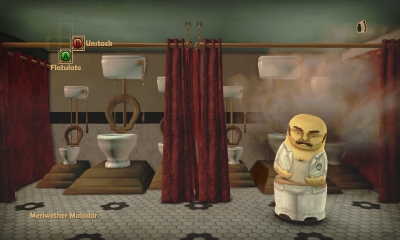
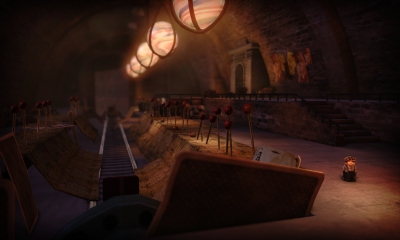
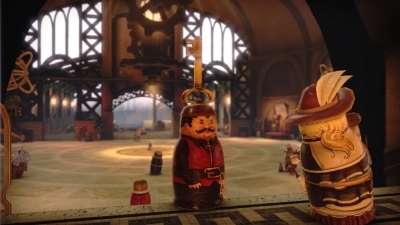
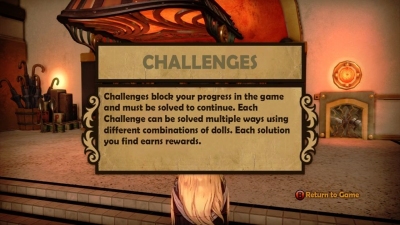
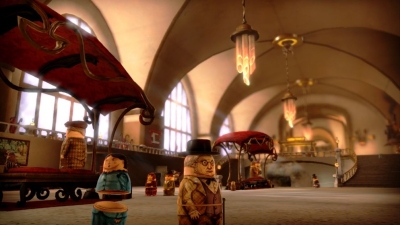
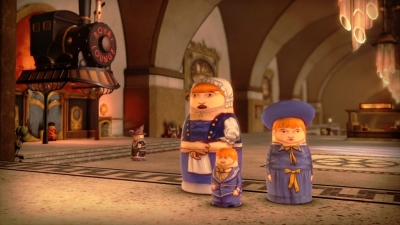
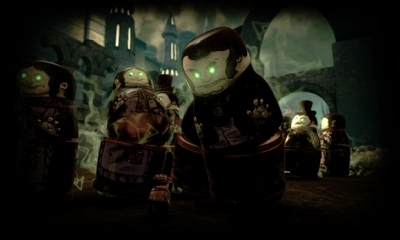
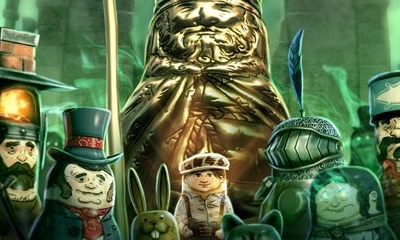
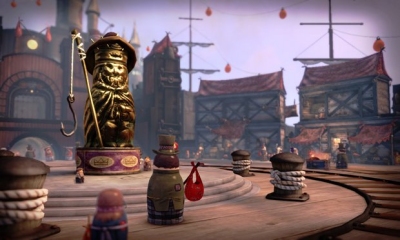
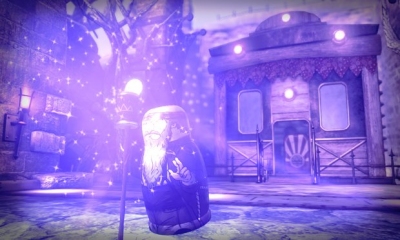

This week we talk about Stacking's compact gameplay, open structure and paradoxical mix of sinister fun.
Download, subscribe via ![]() iTunes,
iTunes, ![]() Podcast RSS or
Podcast RSS or ![]() Email.
Email.

Andy Robertson appears in this podcast. "Videogame reviews for the whole family, not just the kids. I dig out videogame experiences to intrigue and interest grownups and children. This is post-hardcore gaming where accessibility, emotion and storytelling are as important as realism, explosions and bravado."

reallyquitetired appears in this podcast. "hello. I'm reallyquitetired -- recently described by Depressive Monthly magazine, in a probing centre-page feature, as 'Academic, DJ, blogger (with a penchant for odd humour, non-standard uses of language, frank reviews, utilizing fallacious quotations and recommending music to wash to) and Major Depressive Disorder sufferer extraordinaire.'"

Iain Simons appears in this podcast.

Chris Jarvis appears in this podcast. "I write stories to say what I think about games, for me it's the only way I can really communicate what I feel about them. Do you ever have a response to something that's hard to put into words? I find that sometimes I have something to express that can't be communicated by trying to explain how I feel, directly."

Alex Beech appears in this podcast. "Games connect us to exhilaration in various ways. I love mine to scare me. Although the shock, horror and gore are all pretty unnerving, nothing comes close to the sweaty palms of playing games that take you to ridiculously high places - InFamous, Mirror's Edge and Uncharted to name a few."
Before the tape started rolling, here are our scribbled notes.
The stacking mechanic is more than just a original gameplay conceit, it really does cause you to reflect on the nature and function of game characters and the mythical and practical effects of having ‘control' over them. I was constantly surprised at how many interesting and wide-ranging ideas idly playing Stacking brought to mind.
Above all, it's beautifully drawn, stylishly packaged, well observed, charmingly stitched together and endlessly smile-inducing to play and very few games have left me feeling as happy.
Stacking was interesting to compare to Costume Quest, obviously a very different game but also obviously from the same studio. It's interesting how Double Fine's Amnesia Fortnight has almost become a fable in its own right. I'll be interested to see the other games the result from that period.
The game itself soon had my hunting down each and every way to solve the different puzzles - something that doesn't happen very often for me. Like Costume Quest I appreciated being able to see how many solutions there were still to find, and the incentives to go and and discover each one.
The stacking mechanic itself revealed how strictly other games draw the line between player and non-player characters. The first few puzzles can be solved by simply taking control of a particular non-player characters but it took me quite a while to realise this. I was diligently looking for something to use "with" or "on" the character blocking my path like older point-and-click adventures, before I finally realised I could just stack inside them and move them out the way.
Stacking also seems to go it's own way in terms of reading expectations of the player. While most games seem to shy away from presenting the player with too much text to read, reading is one of the central gameplay mechanics in Stacking - as the game makes very clear throughout.
Rather than feeling the need to voice or keep this dialogue punchy, I enjoyed the fact that Double Fine simply expected the player to find the reading an enjoyable part of the experience. Although I didn't find the prose as engaging or easygoing as Costume Quest it was well written enough not to be the barrier I thought it might be when I first realised how much reading I was going to have to do.
I've yet to finish Stacking, and in some ways I'm wanting to eek out the experience so it lasts as long as it can. When I often struggle to finish even half of full priced games this again makes a nice change for me.
So I'm a long way from finishing the game, and am finding myself enjoying the style, the art direction (especially the visual wit - it really rewards attention) - essentially the whole conceit - which is why I'm feeling confused as to why I don't really enjoy it as much as I feel I should.
It's not that I'm not enjoying the cut-scenes (although I don't think the writing is as funny as the set-up demands/deserves), but I think I'm struggling most with how poorly the game seems to flow - for me at least. There are so many incidents of wobbling a few paces to trigger a cut-scene, so many prolonged journeys.
The dolls are detailed, but for me at least, it was difficult to really see the details. I ended up feeling a little frustrated because I *knew* that these lovingly created dolls were there for me to play with, but it was genuinely tricky to get to see them.
Whilst appreciating the hint system and the multiple-solution construction, I found that many of the puzzles I've played so far to be awkward - and in particular, found that the model of ‘special abilities' is frustrating. The point there you have the four complainants trying to reach the captain and you need to get past the guards - each guard requiring a specific doll for their specific ability in order to let you pass... But you have all the dolls already...? Why are you having to do this?
Also - i really didn't enjoy the challenge to ‘rally the children to overpower the chef', to which the solution was to stack into a specific doll and press A to "rally the children". Maybe I'm just too tired.
I totally agree with Chris' points about loving the art, loving the style - and really want to love the game. But it feels like it wants to be smaller and the focus much tighter.
Reading everyone elses' comments, I suspect I might be too early into it - that said, I'm not sure I'd stay all that much longer.
I ended up being more impressed with Stacking than I was initially. I didn't really know anything about it and I found that the opening was a bit too long and the first few quests in the train station were a bit thin. It was worth persevering, however. The cruise ship was, for me, where the game started properly.
What impressed me most about this game is how it takes a complicated concept - that of upgrading character powers, or using specific tools - and wraps them up in a simple concept that any new player would grasp instantly. Combine this with the realisation that you can grab dolls of different sizes and, effectively, store them for later and what you have is an incredibly powerful combo-upgrade process delivered through a seamless and transparent mechanic.
When I think of the hours I have spent in tutorials for Final Fantasy, Assassin's Creed and others, for this game to provide such a high concept in such an intuitive fashion is laudable. And I think in that way it's a good game to introduce to non-gamers, because so much of what you need to do is right there in front of you on the screen.
The other thing that I really enjoyed about this game was the setting. There's not many games that successfully create a historical setting outside of real time strategy. Assassin's Creed II made me realise just how limited the usual range of locations settings are in games. I showed my mum Assassin's Creed II, not because I thought she'd like the game (she almost certainly wouldn't!) but because of its loving recreation of 18th Century Italy, an approach rarely seen in games.
With Stacking, I love the fact that it opens like a kind of pre-revolutionary Russia story - it reminded me of an old eisenstein movie or something, mixed with victorian shadow puppet theatre, although culturally the messages get a bit muddled and it's hard to say if we're in Russia, England or feudal Germany. But in any case it's a pretty unique setting.
I like the hint system, although I would have liked hints to have been available only after you've already found a solution, maybe even two solutions. I don't think many people will have a problem finding at least one of the multiple solutions. Actually I mainly had to use the hints because I just needed a ballpark idea of what the solution might be. You know, if there's something like 50-70 characters in a level, it's good to have something to signpost you in the right direction. There are some that are signposted well, like there's a character with a big red glove mark on his face to show that he's been slapped before and that's a huge clue, but honestly some of the solutions were a bit vague. The hijinks are a challenge, too, but again sometimes you only have the name of the prank to guide you and sometimes you can feel a bit in the dark.
Overall it's nice to see Double Fine producing these types of - almost boutique - games as they demonstrate a lot of creativity and are great fun and no overcomplicated. I think if you compare this side-by-side with Costume Quest you do begin to see a design pattern emerge. You have environmental area full of puzzles to complete at your leisure. I think the downside of this was my only criticism of Costume Quest as well, there is a bit of a feeling that some of the puzzles are the same in each level, just re-skinned. Like how you know there will be a set of matching dolls to find, and there'll be a doll that has to hit a certain number of other dolls, or take a picture or break furniture etc. I think it's done better here than in Costume Quest and the main puzzles are of course very different from level to level because they are based on the setting rather than the mechanics themselves.
Double Fine's recent approach (whether arrived at through necessity or choice) certainly seems to be paying off for them. Their imagination and concepts remain entertaining and novel, but often crumble when attempts are made to extend them much beyond the five or six hour mark. Costume Quest is testament to just how quickly they can create and realise successfully a small scale project, while Brutal Legend demonstrates how the reverse it true with a good idea stumbling under grand ambition (those who site Pychonaughts as a counter example I would argue that it is just a collection of smaller more imaginative ideas which is why it worked so well). Stacking stands as a further conformation that the new approach is working Double Fine, and more than this just how creative everyone at the studio is.
What strikes me most about Stacking is its look, and how it manages to conceal the short time frame the game was created in. By using matryoshka dolls it was possible to create dozens of characters and personalities without pumping hundreds of hours in to their construction (as well as offering a novel game mechanic). This allowed characters to be established through a texture, dialogue (such as it is) and the limited but expressive movement each can muster through their single point of articulation. This economy of design also carries through in to the silent movie framing of events. Where in Costume Quest the lack of spoken dialogue detracted from the polish, in Stacking it simply reinforced the chosen aesthetic.
If Stacking was released five years ago it would be easy to imagine a full boxed release. A beautiful Russian/British industrial revolution look with creative level design and puzzles, there is nothing here that looks like it was constructed on a shoestring budget. While a single play through may only last four hours or so, the of range solutions, character, collectibles, side tasks and humor to be uncovered kept me engaged far beyond the reach of the story.
On balance I thought the vastness of the later stages was a bit miss-leading. Their open nature felt at odds with the structure of the challenges -- where all solutions to a problem seemed to be located near the area they were needed. When looking for the third or fourth solution of a puzzles didn't require a wider view of the level as a whole.
There were many reused puzzles but this tended not to trouble me, and (bar the ones which required the collection of every doll in a set) I wonder if it would be possible to play through the whole game using a different solution for every task thanks to the number of options available, something I may well go back and check one day, although I may need to use the (as yet untouched) hint system to find some of the harder answers.
One thing I did enjoy about the puzzles was that sometimes slightly different solution's counted as the same one. Take the boy crying for his Teddy Bear, signing OR stepping one of the bullies counted as the same solution, which entertained me that not only were there multiple solutions, but multiple methods to those solutions.
From the moment I picked it up until the moment I was done with it (about an hour after I completed it) Stacking kept me thoroughly entertained. With a child hero (as in Costume Quest) it is obvious that Double Fine are hoping to attract a younger audience - maybe inspired by many of the studio now having kids and wanting to show them ‘what mommy/daddy made' - but the humor (and many of the puzzles) ensure it remains entertaining for all audiences.
Here's what else we have written about this:
Stacking 360: An arts and culture journalist interviews a film director about Russian dolls, budgets and petit pois... listen now
Stacking didn't have me rushing to get under the skin of its nested dolls concept. Once inside though I found an intuitive and enjoyably challenging non-linear adventure that redefined my expectations... read now
Stacking: The Lost Hobo King XBLA takes Charlie Blackmore to the Hobo kingdom of Camelfoot in a snappily self-contained downloadable adventure... read now
Stacking is an unsettling mesh of industrial revolution, socialism and stacking Russian dolls. However, it's the layered solutions to each puzzle and wonderfully simple interface that really makes this something special... read now
This week we talk about Stacking's compact gameplay, open structure and paradoxical mix of sinister fun... listen now
More Tired Gamer reviews, chronological or alphabetical.



Game People writes the Game People column.
"Game People podcasts bring you different niche writers from the site to talk about a particular game or series."
© GamePeople 2006-13 | Contact | Huh?

|
Family Video Game Age Ratings | Home | About | Radio shows | Columnists | Competitions | Contact
With so many different perspectives it can be hard to know where to start - a little like walking into a crowded pub. Sorry about that. But so far we've not found a way to streamline our review output - there's basically too much of it. So, rather than dilute things for newcomers we have decided to live with the hubbub while helping new readers find the columnists they will enjoy. |
Our columnists each focus on a particular perspective and fall into one of the following types of gamers:
|